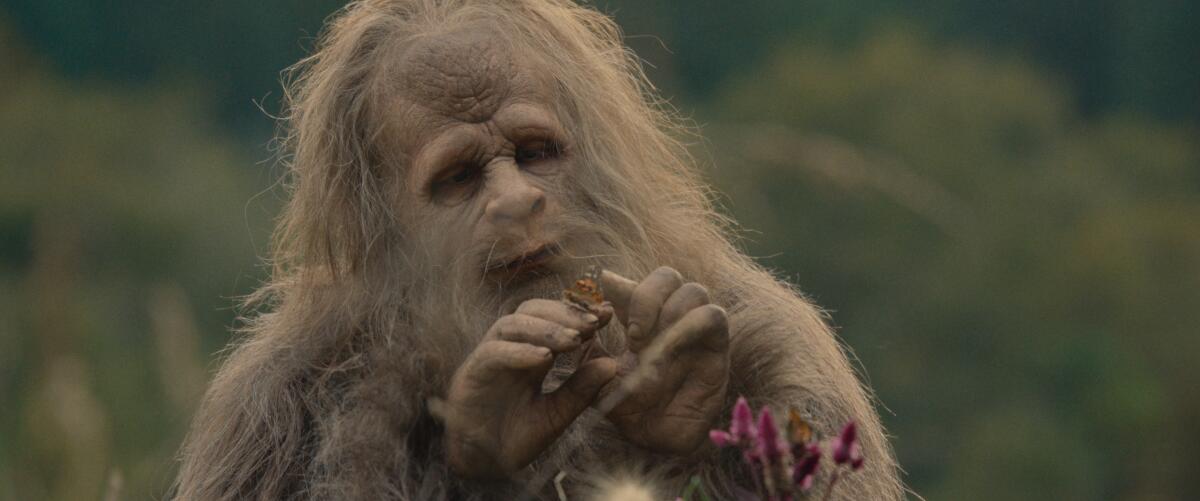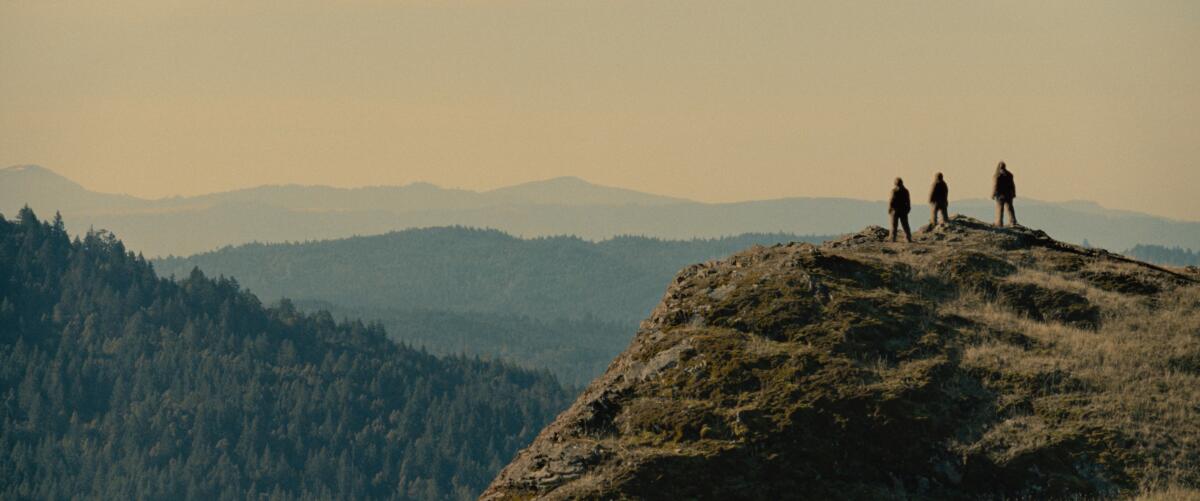In ‘Sasquatch Sunset,’ actors go wild as shaggy beasts with a lifestyle of their own

- Share via
In the wilds of Humboldt County, Riley Keough slouches into view. You won’t recognize the movie star. This is the brothers David Zellner and Nathan Zellner’s wordless marvel “Sasquatch Sunset,” a combination nature doc, silent comedy, survivalist tragedy and, to its four Bigfoot leads, an alien encounter horror show — and she’s playing one of the beasts.
Inside crepey wrinkles and wiry fur, heavy brows and grubby nails, plodding feet and soft, pale bellies are Keough and her three co-stars, Nathan Zellner as the alpha, Jesse Eisenberg as the beta and Christophe Zajac-Denek as the child who occasionally suckles at Keough’s breasts. The only part of the actors you can see under the prosthetics is their pupils. As they mate and fight and groom and sniff and fling poop and feed on whatever they can forage, orange globs of fresh-squeezed salmon roe dribbling down their beards without a whiff of vanity, you’re first wondering how the performers feel to be so visible and yet not. Pure freedom, perhaps? Once adjusted to the film’s unusual rhythms, your attention refocuses on the actual primate characters, especially Keough, the sole female, who occasionally slumps against a tree and stares off into the distance. What is she thinking?
The movie is divided into four seasons. The first and longest is spring, which takes its time revealing the group’s dynamics. The sasquatch do speak, but only in unsubtitled Sasquatchian. “Ooough — aah!” appears to mean something like, “Ready — go!”; the gibbon-esque “whoooo-ooop” seems more emotionally complex. Mostly, we learn them by studying their actions. The alpha is selfish and sex-obsessed. (Cinematographer Mike Gioulakis treats us to at least a half-dozen glimpses of the limp carrot-thing at his crotch, plus, from the alpha’s own POV, an arousing rump shot that’s just a Brazilian wax away from being in a ’90s frathouse sex farce.) The beta is frustrated by his limits: He can’t count higher than four. The child talks to his hand as though he stumbled across a drive-in playing “The Shining,” and the hand talks back, a mystical touch that grates against the lovely naturalism. And the female stares. What is she thinking?
The score tells us what the animals can’t articulate. When they’re content, the music is the kind of airy flutes you’d hear at a day spa. As the mood shifts, a noodling electric guitar kicks in and the gang unconsciously assembles into poses that could be on a grunge album cover. When they’re stoned on mushrooms, we hear spacey, wobbly clanks. (Thankfully, we’re spared the overdone comic relief of going inside their trip; instead, we just appreciate how Zellner’s hungover alpha looks even more hungover than Charles Bukowski at his bottom.) At their most nervous — any time they discover evidence of mankind, even though actual people remain unseen — the sound spirals out into jittery, squealing, inorganic jazz.

Humans are, of course, the aliens, a point the Zellners underscore when the apes gawk at a logger’s spray-painted tree as if it’s the monolith from “2001.” (That movie cliché is also overdone, but I’ll forgive it because it’s so apropos.) But otherwise, the Zellners commendably refuse to saddle these Sasquatch with easy, lazy, obvious ideas of how they behave. What do you think the Sasquatch will do when they come across their first paved road? I’m pretty sure that’s not the response you’ll find here.
But if Keough stays on her current trajectory and, decades from now, wins a lifetime achievement Oscar, I hope the Academy remembers to include a clip of that scene in her reel. Later, there’s an absolutely wrenching moment at an abandoned human campsite that I don’t want to spoil at all, except to say there’s something resonant in her reaction, in a simple, still close-up that shows us how feeling overwhelmed and confused can, in an instant, turn into rage.
Are we looking for the human in the Sasquatch? Or for the Sasquatch in us? The movie works either way, but in its refusal to hew to a familiar plot trajectory, it holds up a mirror to our own narcissism. Our species is used to telling stories: culture-clash fables that turn these independent beings into pets or pals or protectors or spiritual gurus. Because our movies tend to follow an arc of learning and growth, we’re expecting that these animals will share our own exhausting determination to master their surroundings — that at some point, in some way, they’ll evolve. There are moments when you’re absolutely convinced that the Sasquatch are going to discover something — fire, the wheel — that will put them on a path toward becoming more like us. They don’t. They’re not us. And the movie asks us to let go of the snobbery that not being us means they’re dumb.
“Sasquatch Sunset” is a stubborn but playful film that leaves a big footprint on the soul. Especially when we catch on that we’ve been too dumb to grasp their inventions too. One of the first things we see in the opening is all four Sasquatch knocking on tree trunks in unison. We’re clueless. Are they hunting or something? By the end, we’ve grasped that this knocking — and, more important, the listening that follows — is their form of long-distance communication. Maybe they’re looking for a friend they’ve lost. Maybe they’re just looking for anyone who understands.
'Sasquatch Sunset'
Rating: R, for some sexual content, full nudity and bloody images
Running time: 1 hour, 29 minutes
Playing: Now in limited release
More to Read
Only good movies
Get the Indie Focus newsletter, Mark Olsen's weekly guide to the world of cinema.
You may occasionally receive promotional content from the Los Angeles Times.











